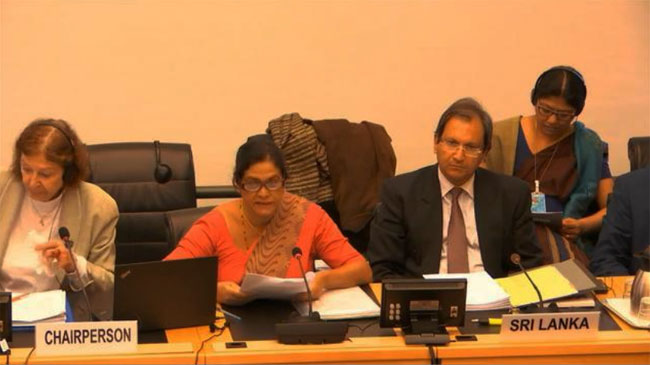Govt says committed to reform Muslim marriage law
January 17, 2018 03:38 pm
The Government of Sri Lanka says that it remains committed to reform the minimum age of marriage for girls under the Muslim law, with the active participation of the concerned community.
“A committee had been set up under the aegis of the Ministry of Justice to carry out the necessary legal reform,” the Sri Lankan delegation told the Committee on the Rights of the Child in Geneva on Tuesday (16).
The Government was following a two-pronged approach to the issue, namely sensitization of the concerned community and discussions with community leaders, while respecting the Convention’s provisions, the delegation said responding to questions from experts.
The Committee on the Rights of the Child on Tuesday concluded its consideration of the combined fifth to sixth periodic report of Sri Lanka under the Convention on the Rights of the Child.
Introducing the report, Chandrani Senaratne, Secretary at the Ministry of Women and Child Affairs of Sri Lanka, noted that building a better future for children, who constituted approximately 30 per cent of the population, and ensuring their security was one of the key objectives of the new Government of Sri Lanka.
In the ensuing discussion, Committee Experts commended the positive steps taken by Sri Lanka with respect to children’s rights, but noted that children did not seem to be understood as rights holders and fully prioritized.
They also inquired about domestication and dissemination of the Convention, inter-sectoral coordination in the implementation of children’s rights, child rights budgeting, a comprehensive data collection system for children’s rights, a children’s commissioner, the impact of businesses on children’s rights, the minimum age of marriage under Muslim law, child marriage, discrimination against children in institutional care, children with disabilities, and lesbian, gay, bisexual, transgender and intersex children, comprehensive anti-discrimination law, risk of landmines and unexploded ordinance, respecting the view of the child, violence against children and corporal punishment, child labour and children employed in sex tourism (“beach boys”), gender-based violence against girls and female genital mutilation, juvenile justice and the minimum age of criminal responsibility, early pregnancy and adolescent health services, the high school dropout rate in rural areas, child trafficking, missing children, and the rehabilitation and reintegration of former child soldiers.
As for the protection of lesbian, gay, bisexual, transgender and intersex children from discrimination, the Sri Lankan delegation said that certain provisions under the Penal Code criminalized same-sex conduct, but that did not reflect the current practice in the country.
The delegation said that the Government was committed to reform all aspects of the Penal Code to bring them into line with international human rights standards.
In all its United Nations treaty body reviews, Sri Lanka had consistently taken the position that article 12 of the Constitution on equality and non-discrimination did not contain an exhaustive list of discrimination grounds.
“As part of the ongoing constitutional reform, Sri Lanka would specifically address discrimination based on gender identity and sexual orientation.”
Responding to the question on why children were perceived as perpetrators and not as victims under the law on sexual orientation, the delegation clarified that the law was inherited from colonial times and that under the current State practice children were not considered as perpetrators.
They also said that there was zero tolerance for child labour, and there were several monitoring measures that were included in the new child labour policy.
As for children employed in sex tourism, the Government had started a pilot project in southern Sri Lanka to work with provincial educational authorities to identify the so-called “beach boys” and offenders.
“The definition of a child was one of the shortfalls in Sri Lanka.” Nevertheless, the majority of statutes defined the child as a person below the age of 18. In the case of rape, the child was defined as a person below the age of 16 as an aggravating factor, it said.
In his concluding remarks, Bernard Gastaud, Committee Expert and head of the task force on Sri Lanka, encouraged the State party to step up its efforts to obtain relevant statistics in order to inform its child programmes and to secure the necessary training and capacity-building for relevant staff.
He also called on the Government to eliminate child marriage and other harmful practices, to identify the remaining missing children, to prevent discrimination in all areas of life, to adopt relevant legislative acts, and to invest further in the national reconciliation process.
In her concluding remarks, Ms. Senaratne stated that the dialogue had been very fruitful and that it would help the Government identify in which areas it needed to invest more effort. The Government was pleased to learn that it was on the right track.
The delegation of Sri Lanka included representatives of the Ministry of Women and Child Affairs, the Ministry of Education, the Ministry of Foreign Affairs, the Attorney General’s Department, and the Permanent Mission of Sri Lanka to the United Nations Office at Geneva.














